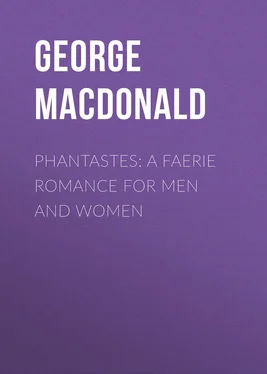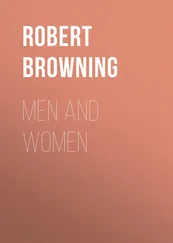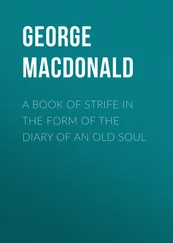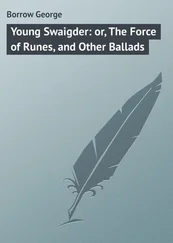George MacDonald - Phantastes - A Faerie Romance for Men and Women
Здесь есть возможность читать онлайн «George MacDonald - Phantastes - A Faerie Romance for Men and Women» — ознакомительный отрывок электронной книги совершенно бесплатно, а после прочтения отрывка купить полную версию. В некоторых случаях можно слушать аудио, скачать через торрент в формате fb2 и присутствует краткое содержание. Жанр: foreign_sf, literature_19, foreign_antique, foreign_prose, на английском языке. Описание произведения, (предисловие) а так же отзывы посетителей доступны на портале библиотеки ЛибКат.
- Название:Phantastes: A Faerie Romance for Men and Women
- Автор:
- Жанр:
- Год:неизвестен
- ISBN:нет данных
- Рейтинг книги:5 / 5. Голосов: 1
-
Избранное:Добавить в избранное
- Отзывы:
-
Ваша оценка:
- 100
- 1
- 2
- 3
- 4
- 5
Phantastes: A Faerie Romance for Men and Women: краткое содержание, описание и аннотация
Предлагаем к чтению аннотацию, описание, краткое содержание или предисловие (зависит от того, что написал сам автор книги «Phantastes: A Faerie Romance for Men and Women»). Если вы не нашли необходимую информацию о книге — напишите в комментариях, мы постараемся отыскать её.
Phantastes: A Faerie Romance for Men and Women — читать онлайн ознакомительный отрывок
Ниже представлен текст книги, разбитый по страницам. Система сохранения места последней прочитанной страницы, позволяет с удобством читать онлайн бесплатно книгу «Phantastes: A Faerie Romance for Men and Women», без необходимости каждый раз заново искать на чём Вы остановились. Поставьте закладку, и сможете в любой момент перейти на страницу, на которой закончили чтение.
Интервал:
Закладка:
Accordingly I sat down, and feeling rather tired, and disinclined for further talk, I asked leave to look at the old book which still screened the window. The woman brought it to me directly, but not before taking another look towards the forest, and then drawing a white blind over the window. I sat down opposite to it by the table, on which I laid the great old volume, and read. It contained many wondrous tales of Fairy Land, and olden times, and the Knights of King Arthur’s table. I read on and on, till the shades of the afternoon began to deepen; for in the midst of the forest it gloomed earlier than in the open country. At length I came to this passage—
“Here it chanced, that upon their quest, Sir Galahad and Sir Percivale rencountered in the depths of a great forest. Now, Sir Galahad was dight all in harness of silver, clear and shining; the which is a delight to look upon, but full hasty to tarnish, and withouten the labour of a ready squire, uneath to be kept fair and clean. And yet withouten squire or page, Sir Galahad’s armour shone like the moon. And he rode a great white mare, whose bases and other housings were black, but all besprent with fair lilys of silver sheen. Whereas Sir Percivale bestrode a red horse, with a tawny mane and tail; whose trappings were all to-smirched with mud and mire; and his armour was wondrous rosty to behold, ne could he by any art furbish it again; so that as the sun in his going down shone twixt the bare trunks of the trees, full upon the knights twain, the one did seem all shining with light, and the other all to glow with ruddy fire. Now it came about in this wise. For Sir Percivale, after his escape from the demon lady, whenas the cross on the handle of his sword smote him to the heart, and he rove himself through the thigh, and escaped away, he came to a great wood; and, in nowise cured of his fault, yet bemoaning the same, the damosel of the alder tree encountered him, right fair to see; and with her fair words and false countenance she comforted him and beguiled him, until he followed her where she led him to a–”
Here a low hurried cry from my hostess caused me to look up from the book, and I read no more.
“Look there!” she said; “look at his fingers!”
Just as I had been reading in the book, the setting sun was shining through a cleft in the clouds piled up in the west; and a shadow as of a large distorted hand, with thick knobs and humps on the fingers, so that it was much wider across the fingers than across the undivided part of the hand, passed slowly over the little blind, and then as slowly returned in the opposite direction.
“He is almost awake, mother; and greedier than usual to-night.”
“Hush, child; you need not make him more angry with us than he is; for you do not know how soon something may happen to oblige us to be in the forest after nightfall.”
“But you are in the forest,” said I; “how is it that you are safe here?”
“He dares not come nearer than he is now,” she replied; “for any of those four oaks, at the corners of our cottage, would tear him to pieces; they are our friends. But he stands there and makes awful faces at us sometimes, and stretches out his long arms and fingers, and tries to kill us with fright; for, indeed, that is his favourite way of doing. Pray, keep out of his way to-night.”
“Shall I be able to see these things?” said I.
“That I cannot tell yet, not knowing how much of the fairy nature there is in you. But we shall soon see whether you can discern the fairies in my little garden, and that will be some guide to us.”
“Are the trees fairies too, as well as the flowers?” I asked.
“They are of the same race,” she replied; “though those you call fairies in your country are chiefly the young children of the flower fairies. They are very fond of having fun with the thick people, as they call you; for, like most children, they like fun better than anything else.”
“Why do you have flowers so near you then? Do they not annoy you?”
“Oh, no, they are very amusing, with their mimicries of grown people, and mock solemnities. Sometimes they will act a whole play through before my eyes, with perfect composure and assurance, for they are not afraid of me. Only, as soon as they have done, they burst into peals of tiny laughter, as if it was such a joke to have been serious over anything. These I speak of, however, are the fairies of the garden. They are more staid and educated than those of the fields and woods. Of course they have near relations amongst the wild flowers, but they patronise them, and treat them as country cousins, who know nothing of life, and very little of manners. Now and then, however, they are compelled to envy the grace and simplicity of the natural flowers.”
“Do they live in the flowers?” I said.
“I cannot tell,” she replied. “There is something in it I do not understand. Sometimes they disappear altogether, even from me, though I know they are near. They seem to die always with the flowers they resemble, and by whose names they are called; but whether they return to life with the fresh flowers, or, whether it be new flowers, new fairies, I cannot tell. They have as many sorts of dispositions as men and women, while their moods are yet more variable; twenty different expressions will cross their little faces in half a minute. I often amuse myself with watching them, but I have never been able to make personal acquaintance with any of them. If I speak to one, he or she looks up in my face, as if I were not worth heeding, gives a little laugh, and runs away.” Here the woman started, as if suddenly recollecting herself, and said in a low voice to her daughter, “Make haste—go and watch him, and see in what direction he goes.”
I may as well mention here, that the conclusion I arrived at from the observations I was afterwards able to make, was, that the flowers die because the fairies go away; not that the fairies disappear because the flowers die. The flowers seem a sort of houses for them, or outer bodies, which they can put on or off when they please. Just as you could form some idea of the nature of a man from the kind of house he built, if he followed his own taste, so you could, without seeing the fairies, tell what any one of them is like, by looking at the flower till you feel that you understand it. For just what the flower says to you, would the face and form of the fairy say; only so much more plainly as a face and human figure can express more than a flower. For the house or the clothes, though like the inhabitant or the wearer, cannot be wrought into an equal power of utterance. Yet you would see a strange resemblance, almost oneness, between the flower and the fairy, which you could not describe, but which described itself to you. Whether all the flowers have fairies, I cannot determine, any more than I can be sure whether all men and women have souls.
The woman and I continued the conversation for a few minutes longer. I was much interested by the information she gave me, and astonished at the language in which she was able to convey it. It seemed that intercourse with the fairies was no bad education in itself. But now the daughter returned with the news, that the Ash had just gone away in a south-westerly direction; and, as my course seemed to lie eastward, she hoped I should be in no danger of meeting him if I departed at once. I looked out of the little window, and there stood the ash-tree, to my eyes the same as before; but I believed that they knew better than I did, and prepared to go. I pulled out my purse, but to my dismay there was nothing in it. The woman with a smile begged me not to trouble myself, for money was not of the slightest use there; and as I might meet with people in my journeys whom I could not recognise to be fairies, it was well I had no money to offer, for nothing offended them so much.
Читать дальшеИнтервал:
Закладка:
Похожие книги на «Phantastes: A Faerie Romance for Men and Women»
Представляем Вашему вниманию похожие книги на «Phantastes: A Faerie Romance for Men and Women» списком для выбора. Мы отобрали схожую по названию и смыслу литературу в надежде предоставить читателям больше вариантов отыскать новые, интересные, ещё непрочитанные произведения.
Обсуждение, отзывы о книге «Phantastes: A Faerie Romance for Men and Women» и просто собственные мнения читателей. Оставьте ваши комментарии, напишите, что Вы думаете о произведении, его смысле или главных героях. Укажите что конкретно понравилось, а что нет, и почему Вы так считаете.












